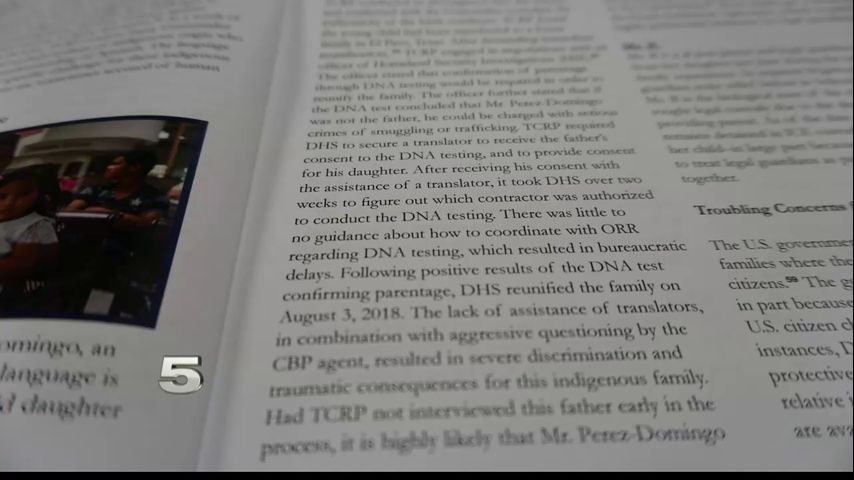Families Still Being Separated at Border Despite Court Orders
MCALLEN - A report from the Texas Civil Rights Project reveals family separation continues in the Rio Grande Valley, despite the June 20 Executive Order mandating it to stop.
Over the summer, the federal public defenders at the McAllen courthouse were handling cases of parents who had crossed the border illegally; their children were taken into governmental custody.
The Texas Civil Rights Project, or TCRP, began documenting cases of separation starting June 22 through Dec. 17.
A total of 272 adults were separated from a child relative.
Laura Peña with TCRP adds, "thirty-eight of those cases were parents and legal guardians separated from their children. Of those, 46 children were separated from their parents, 25 of them were 10 years old or younger. The youngest baby was eight and a half months old."
This information made its way to lawmakers and on Tuesday, they questioned Border Patrol Chief Carla Provost in a hearing before the U.S. House of Representatives Committee on the Judiciary.
Provost explained how agents determine which families to separate.
"We do an initial determination, and we are not making a determination that they cannot be placed back together," said Chief Provost after being questioned by U.S. Representative Karen Bass.
Provost continued, "But as an example, and I see this because I get the daily reports, quite often we have individuals that have convictions for domestic violence. If I may explain a little further, I turn them over to ICE. ICE is not going to put somebody with that type of criminal conviction in a family residential center. And we have to make that separation."
The criminal convictions show up in some of the families identified by the Texas Civil Rights Project report.
Peña says one parent fled sexual slavery and shot her captor who survived; another parent had a decade-old battery charge for a neighborhood brawl.
Though each circumstance varies, questions remain as to whether crossing the border illegally would be grounds for separation; that sat at the core of the Zero Tolerance Policy.
U.S. Representative Veronica Escobar asked Chief Provost, "Does that include illegal entry?" Provost replied, "It is not for standard entry. If they have a felony charge, it can include illegal re-entry."
"So, they are being separated today because of illegal re-entry?," Escobar responded. "That is a felony," clarified Provost. "If they have a conviction for it from previous, where they have a felony conviction they would be a felon, so then in that case."
Another case fund by the Texas Civil Rights Project was a Guatemalan father.
He was asked about his relationship to his daughter, but he only spoke Mam, a native language.
Translation problems led to separation, and eventually, he was reunited.
Still, some cases confound researchers.
"In at least ten cases of the 38 parent/child separations, the parents had no known criminal history and no known prior removals from the United States," Peña said.
The Texas Civil Rights Project will continue monitoring the McAllen federal courthouse to keep track of family separations in the future.
Border Patrol Chief Carla Provost was also questioned about agents training so they could better determine whether a child is in danger, something similar to a social worker.
Provost said training standards include reviewing the Flores Settlement Agreement and the Trafficking Victims Protections Reauthorization Act.




